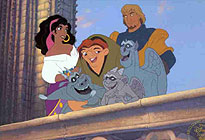|
|
|
|
The
Hunchback of Notre Dame
|
 |
|
After Pocahontas (1995), I shuddered at the thought of another animated musical from Walt Disney Pictures. These films have settled into an underwhelming formula: a classic tale watered down and cleaned up, spankingly pure heroes and heroines, a patsy villain, cute animal sidekicks, a visual look belonging to the 1950s, and second-rate show tunes. Until the day I die, I will wonder: how on earth are such confections meant to appeal to kids who are growing up on The Simpsons, Mighty Morphin Power Rangers and Top 40 radio? But here is the good news. The Hunchback of Notre Dame, although hewing close to the same old Disney formula, is a much more satisfying entertainment than Pocahontas. It moves faster, the jokes are cleverer, and one or two of the songs are even pleasant. Any adults with traumatic memories of the grotesque and tragic elements in Victor Hugo's novel, or the 1937 Hollywood version starring Charles Laughton, can be immediately reassured. The hunchback's deformities, the humiliations he suffers, his unrequited pining for love – all these disquieting, heartrending elements are briskly shaved down to unthreatening proportions. Yet an echo of the original story's pathos and appeal still remains, which is something of a miracle under the circumstances. The camp one-liners given to three gargoyles help immeasurably, as does the fact that the central female character, Esmeralda (voiced by Demi Moore), actually has a discernible womanly form – a great improvement on the sexless, flat-chested figure of Pocahontas. Watching the endless procession of technical credits one wonders why, amidst so much prodigious display of craft, the art tends to disappear from Walt Disney Pictures these days. Particular aesthetic effects – such as the curious contrivance of out-of-focus backgrounds to mimic live-action photography – quickly become tedious. Nonetheless, The Hunchback of Notre Dame is a disarmingly enjoyable diversion. And Cultural Studies scholars should take special note: the rousing set-piece devoted to "Topsy Turvy Day" betrays a remarkably sophisticated understanding of the carnivalesque tradition in popular art. MORE Trousdale/Wise: Atlantis: The Lost Empire, Beauty and the Beast © Adrian Martin September 1996 |
![]()